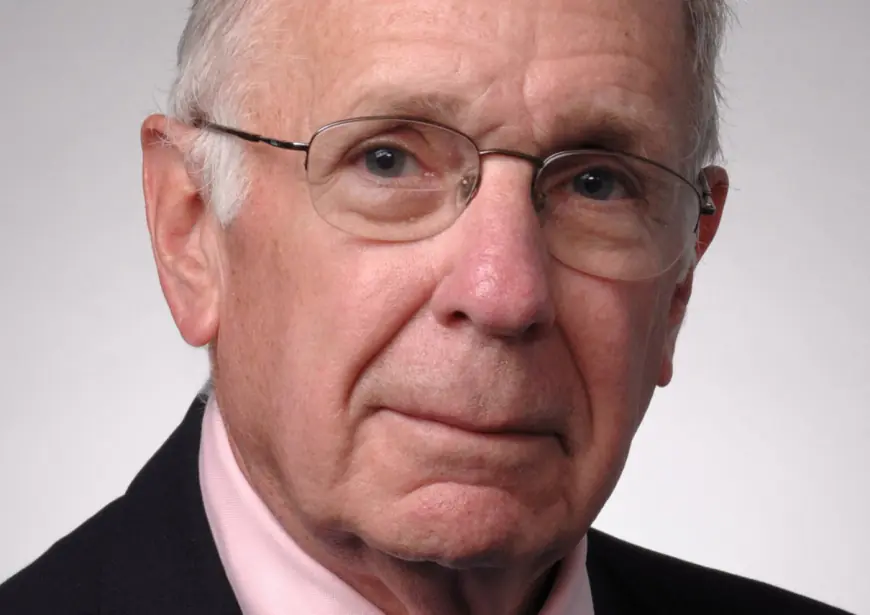Robert Helman, helped diversify Mayer Brown client base, dies at 90
Robert Helman, who helped expand the size and diversity of Mayer Brown in his 56 years with the global, white-shoe law firm, has died.

Robert Helman helped expand the size and diversity of Mayer Brown in his 56 years with the global, white-shoe law firm.
“Bob was always promoting me and other younger partners to clients, and was incredibly generous in doing so — he never hoarded clients, but instead always tried to get us in front of clients, reveling in any success we had,” said U.S. District Judge Thomas M. Durkin, a Mayer Brown partner from 1993 until 2012.
Helman, 90, died after an extended illness on Oct. 4 at his home, said his son, Adam. He was a longtime resident of the South Side Kenwood and Hyde Park neighborhoods.
Born in Chicago, Helman grew up on the West Side. His father was Nathan W. Helman, CEO of Mount Sinai Hospital and Medical Center. Helman attended Austin High School, where he edited the school newspaper, served in student government and delivered the farewell address upon his graduation in January 1951.
Helman received a bachelor of science degree in law from Northwestern University in 1954. He then picked up a law degree from Northwestern and in his final year served as associate editor of the law review. Helman served stateside in the Army from 1956 until 1958, his son said.
Helman began his law career with the firm of Isham, Lincoln & Beale, where he was an associate until becoming a partner in 1965. While at the Isham law firm, he represented utility clients, including Northern Illinois Gas Co., now Nicor Gas.
Client conflicts led Helman and a senior partner, Justin Stanley, to amicably leave Isham firm and join Mayer Brown, then known as Mayer Brown & Platt, taking the Northern Illinois Gas account with them. Helman later began representing other large companies, including railroads, accounting firms, banks and telecommunications companies.
“Bob was without question a great lawyer,” said Mayer Brown senior counsel John Schmidt, a former gubernatorial candidate and U.S. associate attorney general. “I think more CEOs and general counsels of major corporations turned to him for counsel than to any (other) Chicago lawyer of his generation — maybe of any generation.”
Helman represented Schaumburg-based Santa Fe Pacific Corp. when it merged the Atchison, Topeka and Santa Fe Railway into the Burlington Northern Railroad in 1996 and created the BNSF Railway, the largest freight railway in the U.S.
Schmidt said Helman’s success with his clients came from his “extraordinary capacity to see issues in the context of the legal system as a whole that I think came from experience representing a remarkable range of clients. And once they set a course of action, he had a focus and tenacity in getting to a result unsurpassed by any lawyer of my experience.”

Helman also represented the city of Chicago in its franchise renewal negotiations with Commonwealth Edison in the early 1990s.
“What he really enjoyed about being an attorney was that he saw the law — especially the kind of law he practiced — as a fair way to resolve disputes, and I think he thought of it as a level playing field,” Adam Helman said. “There also was an aspect of it being a meritocracy. If you were hard-working and intelligent and had the right kind of personality and mindset, you could be successful over time.”
Helman was chairman of Mayer Brown from 1984 until 1998. He had to navigate a stressful stretch early on, when Chicago-based client Continental Illinois National Bank and Trust Co. in 1984 became the largest bank failure in U.S. history due to some bad loans made to the energy industry.
Continental, which made up about one third of Mayer Brown’s revenues, needed to be bailed out by the federal government, and in the wake of that implosion, Helman successfully worked to diversify Mayer Brown’s client base, particularly through representing corporate clients undertaking mergers and acquisitions.
“One of the lessons of Continental Bank was that they needed a broader portfolio of business and they needed scale, which is why they increased in size so much (afterward),” Helman’s son said.
“He was tireless and brought an upbeat energy to legal work that made him enjoyable, although very demanding, to work with,” Schmidt said.
Helman later headed Mayer Brown’s policy and planning committee. He retired from the firm in January.
Through his Mayer Brown work, Helman also served as a board member of Northern Trust, Zenith and the Chicago Stock Exchange. He helped found the Legal Assistance Foundation of Chicago — now Legal Aid Chicago — and was the group’s president from 1973 until 1976.
“He was intentional — he didn’t do things by accident,” his son said. “He was not come what may — he was intentional about his work, he was intentional about making time to enjoy himself, he was intentional about his family and he was intentional about serving the community.”
Helman also is survived by his wife of 66 years, Janet; another son, Marcus; a daughter, Sarah; a sister, Marjorie Kravitz; and two grandchildren.
A memorial service will take place at 2:30 p.m. Nov. 15 at the Chicago Club, 81 E. Van Buren St., Chicago.
Goldsborough is a freelance reporter.
What's Your Reaction?









































































































